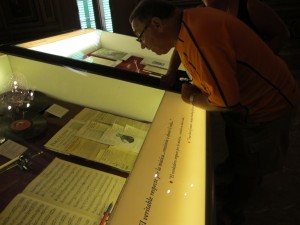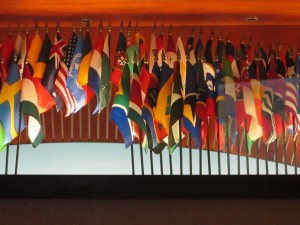Pau Casals: An artist who told the world the truth
The visitor enters a small passageway leading to the 17 room Pablo Casals Museum in Vendrell, Spain, at once immersed in cello music and a voiceover narration from the diary of a young Casals. The music surrounds a display of some of the first instruments belonging to the artist. This multisensory approach to the array of prints, photographs, artwork, letters, newspaper articles, recordings, musical scores and programs that form the collection at the museum is a most appropriate way to honor the many facets of Pablo Casals, a musician, composer, orchestral conductor, teacher and ardent anti-fascist and activist on behalf of world peace.
I visited this museum in late September of 2013, in the company of FFALB and IBMT members Bobbie Rabinowitz, Margaret and Pearce McKenna and Lynda and Ernest Walker. Our visit was a fitting coda to the IBMT’s Ebro Battlefield Tour, in which we had commemorated the heroism of the Fifteenth Brigade’s British Battalion, Connolly Column and Abraham Lincoln Brigade. Together, we took a journey through Casals’ development as an artist and world citizen, culminating in the exhibit of the United Nations Peace Prize bestowed by UN Secretary U Thant in 1971.
Casals’ statement that “Music, this wonderful universal language, must be a source of communication between all people” is suspended over the Music Room, a concert area decorated with Casals’ own 18th century set of paintings by the Catalan artist El Vigata, where the visitor can pause to hear Casals’ performing Bach’s solo suites. It leads to a room documenting Casals international renown.
Ernest Walker noticed an article in a local Sheffield paper, written at the time Casals played for Queen Victoria at Osbourne House , accompanied by another, unrelated Ernest Walker.
At the height of his fame, Casals refused to play in his homeland or in any country that supported its’ fascist regime. During the war he visited the concentration camps in France filled with the exiles from republican Spain and performed concerts for the Free French. Casals’ principled opposition to the Franco regime was greatly admired by the Brigadistas in the United States, to whom he lived in close proximity in self imposed exile in Puerto Rico until his death in 1973, determined not to return to Spain until democracy was restored. One of the most fascinating portions of the museum is this documentation of his steadfast stand. The section begins with a banner of his statement “How could I bask in the applause at the concerts and the awards they bestowed upon me while my fellow countrymen suffered so?” We read a letter from Casals written to President Truman in 1950 in which he said, “You can well understand, then, Mr. President, how painfully disappointed I was at seeing the manner in which the great democracies left the Spanish Republic to its fate as it was fighting the three-fold menace of Nazism, Fascism and Falangism. It should be evident to us that a true and lasting liberty cannot exist without the faithful cooperation of (the former allies.)”
A generous spirited teacher, Casals exhorted his students “to be young, young all your life, and to tell the world the truth.” This saying frames the conclusion of the exhibition.
As we approached the showcase of his Peace Medal from the United Nations it was heartening to come to the letter for his nomination for the Nobel Peace Prize in 1958. The nominators characterized the peace activist as “using the cello and baton as his only weapons.” While Spain’s influence contributed to the Nobel Peace Prize remaining elusive, the United Nations Peace Medal was awarded for his campaigns against the use of nuclear weapons as well as his untiring fight for peace and justice.
Perhaps Nuria Ballester, the director of the Museu Pau Casals expressed it best when she said, “With the hard work before us in this difficult time of economic problems, the message of Pablo Casals gives us the energy to go ahead and fight for a better world.”
We hope she enjoyed the gift of a pre-mature anti-fascist T shirt from our group.
ALBA Board Member Nancy Wallach is the daughter of Abraham Lincoln Brigade Veteran Hy Wallach.














